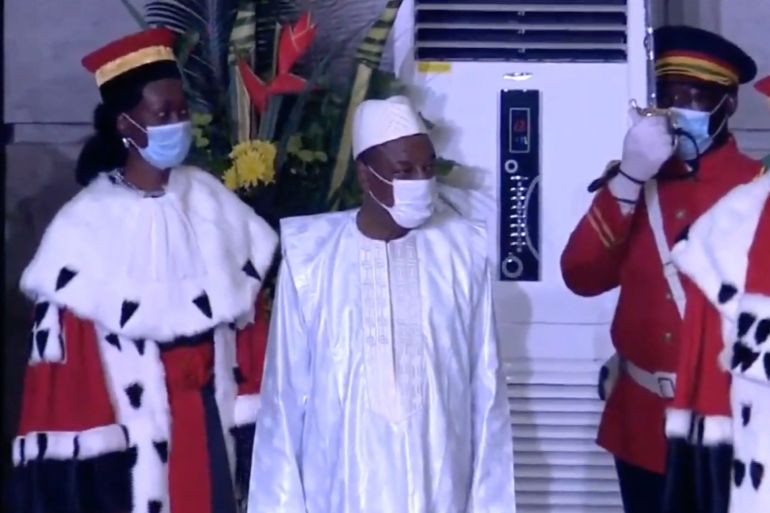Guinean President Conde sworn in for controversial third term
The opposition accused the president of pushing through a constitutional amendment to cling to power and alleged irregularities in final results of October’s vote.

Guinean President Alpha Conde has taken the oath of office for a controversial third term following disputed elections that were marred by violence.
At his swearing-in ceremony on Tuesday, the 82-year-old appealed for unity as he called on Guineans to “forget the past” and turn towards “a united future”.
Keep reading
list of 4 itemsSummer Lee’s primary race tests fallout for critics of the US’s Gaza policy
Maldives votes in parliamentary elections amid India-China rivalry
Will India’s election be free and fair?
“I urge every one of you to forget the divisive past and turn towards a future of unity and hope,” Conde said at the event in the capital, Conakry, that was attended by a number of African heads of state.
“Everyone must uphold the law and ban violence from their words and acts so that our country remains a community of freedom and responsibility,” said Conde, who was dressed in a white gown.
The country’s opposition had condemned Conde’s run in the October 18 election as an abuse of power. They charged that Conde has pushed through a revamped constitution in March in a plot to sidestep the two-term limit for presidential mandates.
Conde, a former opposition figure whom an authoritarian leader once sentenced to death, had argued the new constitution would modernise the country. In 2010, he became the country’s first democratically elected president and won re-election in 2015.
Presidential terms in the West African country last for six years.
Al Jazeera’s Nicolas Haque, who has reported extensively on Guinea, said activists watching Tuesday’s swearing-in see it is part of a larger trend of West African leaders altering their country’s constitution to stay in power.
That includes Ivory Coast President Alassane Ouattara, who was sworn in on Monday after also winning a controversial third term and was present at the event in Conakry.
Congolese activist Fred Bauma told Al Jazeera Conde’s victory showed “that the leaders of a certain generation are not ready to leave”.
“There is a new wave in Africa of people wanting more democracy and true democracy,” he said. “I think the message that we get from [these leaders] is that we need … to force them to let a new generation come in, especially to let new habits, new ideas and new practices come in.”
Clashes following the vote in Guinea have claimed at least 21 lives, according to the government, while the main opposition UFDG party put the death toll at 46.
Conde’s main challenger Cellou Dalein Diallo and other opposition candidates alleged irregularities in the official results announced two weeks ago that showed Conde won with 59.5 percent of the vote.
In November, Guinea’s constitutional court confirmed Conde’s victory, rejecting those allegations.